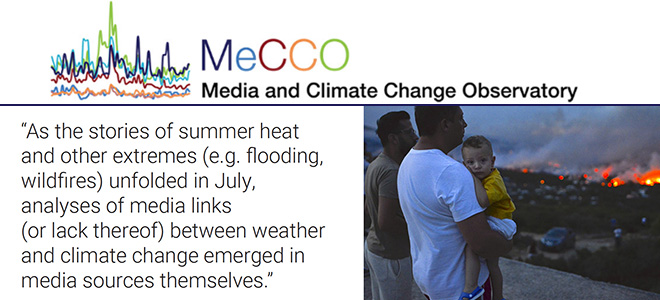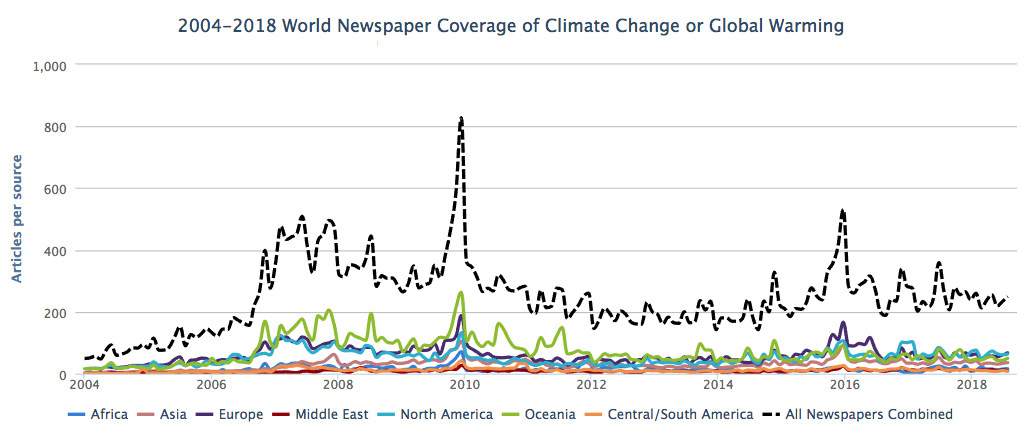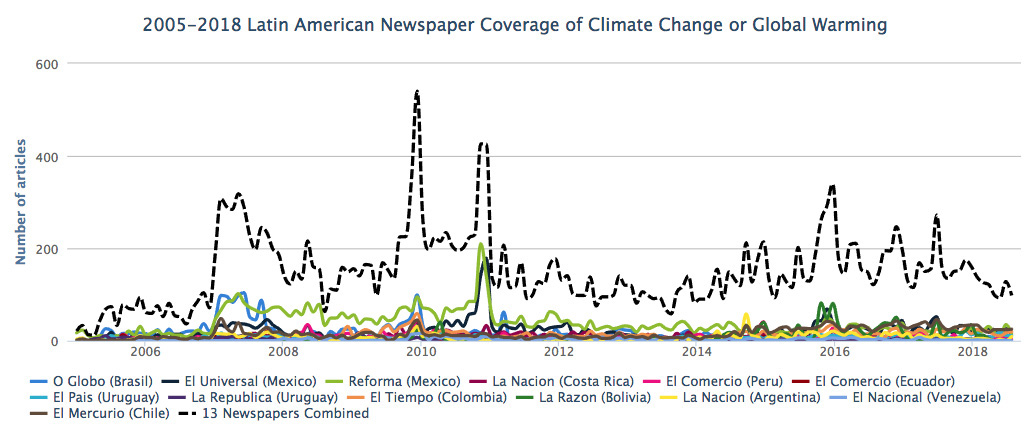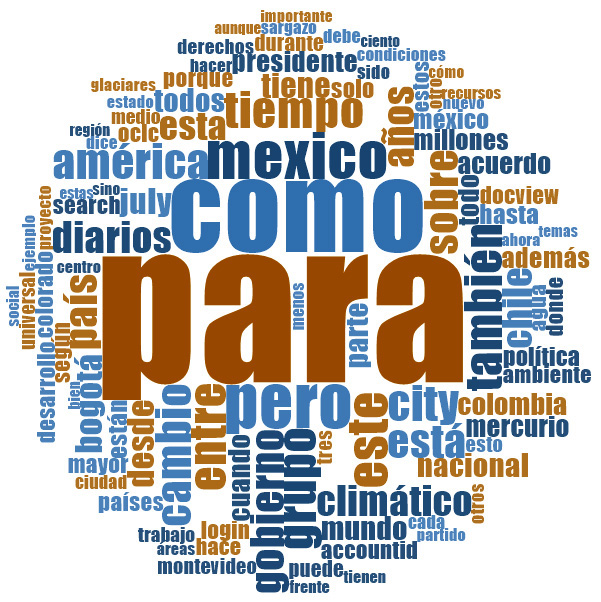
Media and Climate Change Observatory (MeCCO)
July 2018 Summary
July media attention to climate change and global warming was up 7% throughout the world from the previous month of June 2018, but down about 2% from July last year. Increases were detected in Asia (up 7%), Africa (up 9%) Europe (up 11%), Oceania (up 16%), and North America (up 5%), while going down in the Middle East and Central/South America (-23% in each). At the country level, coverage went up from the previous month in Australia (+20%), Germany (+28%), New Zealand (+9%), the United Kingdom (UK) (+13%), and the United States (+27%), while it went down in Canada (-29%), India (-7%), and Spain (-31%).
Figure 1 shows these ebbs and flows in media coverage at the global scale – organized into seven geographical regions around the world – over the past 175 months (from January 2004 through July 2018).

In January of this year, MeCCO expanded coverage to sixty-two newspaper sources, six radio sources and six television sources. These span across thirty-eight countries, in English, Spanish, German and Portuguese. We strengthened our Spanish-language searches for articles with the presence of terms “cambio climático” or “calentamiento global”, while we expanded our searches now to Portuguese through searches for the terms “mudanças climáticas” or “aquecimento global”. Figure 2 shows Latin American newspaper coverage over 163 months now (January 2005 through July 2018).

Moving to considerations of content within these searches, Figure 3 shows word frequency data at the Latin American newspapers in July 2018.
 In July, considerable coverage related to ecological and meteorological issues, and this spun into a meta-analysis of the extent to which media connected extreme events (e.g. heat waves) with a changing climate. Beginning the month, there were a number of stories about extreme weather events around the world. For examples, in July heat records were set in many northern hemispheric countries. In particular, record setting lows in cities like Montreal, Quebec in Canada and Los Angeles, California in the US threatened vulnerable populations with unprecedented heat. While Alanne Orjoux from CNN reported on 17 heat-related deaths in Quebec at the time of reporting (raised a few days later to 33, according to ABC News (Australia)), over in the UK, the BBC reported record-setting heat across England and Wales. Meanwhile, southern California baked in many all-time temperature records. Journalist Shelby Grad from Los Angeles Times wrote that “the heat brought a big surge in power use — and power outages…Peak energy demand climbed to 6,256 megawatts Friday, knocking down the previous July record of 6,165 megawatts set in 2006 and making it the fifth-highest peak demand recorded in the city’s history…Consumers were urged to reduce their electricity usage from 2 p.m. to 9 p.m. Saturday, the hours when high use is typical. (Air conditioners pull much of that power, but other appliances such as washing machines, dryers and dishwashers also contribute)”. In mid-July, The Guardian journalist Jonathan Watts reported that “Record high temperatures have been set across much of the world this week as an unusually prolonged and broad heatwave intensifies concerns about climate change” and a “concern is that weather fronts – hot and cold – are being blocked more frequently due to climate change. This causes droughts and storms to linger, amplifying the damage they cause. This was a factor in the recent devastating floods in Japan, where at least 150 people died after rainfall up to four times the normal level”. On the heels of the flooding in Japan, a heat wave then swept over the country where many without power due to the flooding were vulnerable to the high daytime and nighttime temperatures. Journalist Elaine Lies from The Sydney Morning Herald wrote, “An intense heat wave has killed at least 14 people over a three-day long weekend in Japan, media reported on Tuesday, as high temperatures hampered recovery efforts in flood-hit areas where more than 200 people died last week”. At the end of July, journalists Saw Nang and Richard C. Paddock of The New York Times reported on Myanmar flooding that had displaced over 16,000 people by July 31. For the story they interviewed Myanmar’s minister of social welfare, relief and resettlement, Win Myat Aye, who blamed heavy monsoon rains and climate change for the recent flooding. He said, “I just want to alert the people that climate is changing all over the world and we all have to be careful about it”. However, while these particular stories made connections between weather and climate change, they were exceptions rather than the norm. Read more …
In July, considerable coverage related to ecological and meteorological issues, and this spun into a meta-analysis of the extent to which media connected extreme events (e.g. heat waves) with a changing climate. Beginning the month, there were a number of stories about extreme weather events around the world. For examples, in July heat records were set in many northern hemispheric countries. In particular, record setting lows in cities like Montreal, Quebec in Canada and Los Angeles, California in the US threatened vulnerable populations with unprecedented heat. While Alanne Orjoux from CNN reported on 17 heat-related deaths in Quebec at the time of reporting (raised a few days later to 33, according to ABC News (Australia)), over in the UK, the BBC reported record-setting heat across England and Wales. Meanwhile, southern California baked in many all-time temperature records. Journalist Shelby Grad from Los Angeles Times wrote that “the heat brought a big surge in power use — and power outages…Peak energy demand climbed to 6,256 megawatts Friday, knocking down the previous July record of 6,165 megawatts set in 2006 and making it the fifth-highest peak demand recorded in the city’s history…Consumers were urged to reduce their electricity usage from 2 p.m. to 9 p.m. Saturday, the hours when high use is typical. (Air conditioners pull much of that power, but other appliances such as washing machines, dryers and dishwashers also contribute)”. In mid-July, The Guardian journalist Jonathan Watts reported that “Record high temperatures have been set across much of the world this week as an unusually prolonged and broad heatwave intensifies concerns about climate change” and a “concern is that weather fronts – hot and cold – are being blocked more frequently due to climate change. This causes droughts and storms to linger, amplifying the damage they cause. This was a factor in the recent devastating floods in Japan, where at least 150 people died after rainfall up to four times the normal level”. On the heels of the flooding in Japan, a heat wave then swept over the country where many without power due to the flooding were vulnerable to the high daytime and nighttime temperatures. Journalist Elaine Lies from The Sydney Morning Herald wrote, “An intense heat wave has killed at least 14 people over a three-day long weekend in Japan, media reported on Tuesday, as high temperatures hampered recovery efforts in flood-hit areas where more than 200 people died last week”. At the end of July, journalists Saw Nang and Richard C. Paddock of The New York Times reported on Myanmar flooding that had displaced over 16,000 people by July 31. For the story they interviewed Myanmar’s minister of social welfare, relief and resettlement, Win Myat Aye, who blamed heavy monsoon rains and climate change for the recent flooding. He said, “I just want to alert the people that climate is changing all over the world and we all have to be careful about it”. However, while these particular stories made connections between weather and climate change, they were exceptions rather than the norm. Read more …


MeCCO Monthly Summary: Connecting the Dots
Media and Climate Change Observatory (MeCCO)
July 2018 Summary
July media attention to climate change and global warming was up 7% throughout the world from the previous month of June 2018, but down about 2% from July last year. Increases were detected in Asia (up 7%), Africa (up 9%) Europe (up 11%), Oceania (up 16%), and North America (up 5%), while going down in the Middle East and Central/South America (-23% in each). At the country level, coverage went up from the previous month in Australia (+20%), Germany (+28%), New Zealand (+9%), the United Kingdom (UK) (+13%), and the United States (+27%), while it went down in Canada (-29%), India (-7%), and Spain (-31%).
Figure 1 shows these ebbs and flows in media coverage at the global scale – organized into seven geographical regions around the world – over the past 175 months (from January 2004 through July 2018).
In January of this year, MeCCO expanded coverage to sixty-two newspaper sources, six radio sources and six television sources. These span across thirty-eight countries, in English, Spanish, German and Portuguese. We strengthened our Spanish-language searches for articles with the presence of terms “cambio climático” or “calentamiento global”, while we expanded our searches now to Portuguese through searches for the terms “mudanças climáticas” or “aquecimento global”. Figure 2 shows Latin American newspaper coverage over 163 months now (January 2005 through July 2018).
Moving to considerations of content within these searches, Figure 3 shows word frequency data at the Latin American newspapers in July 2018.